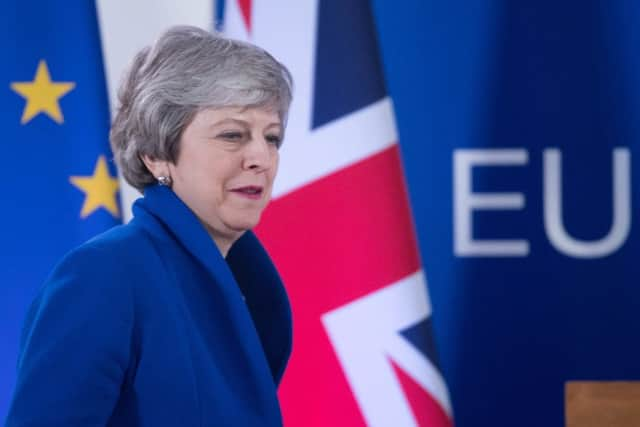UK will elect new MEPs as Brexit deal is put off until as late as July
David Lidington, the Cabinet Office minister and Theresa May’s deputy, admitted there was not enough time to pass legislation to implement a Brexit deal before voters go to the polls on 23 May.
With cross-party talks yet to produce a compromise Brexit deal, Downing Street conceded that its new target was to reach an agreement before the summer recess, which starts at the end of July. Confirmation that European elections would go ahead came with only hours to go before a voter registration deadline.
Advertisement
Hide AdAdvertisement
Hide AdSpeaking ahead of the resumption of talks between the two main parties, Mr Lidington insisted the government would be “redoubling our efforts” to get an EU withdrawal agreement ratified by the start of July so the MEPs elected this month never have to take their seats.


But he conceded: “Parliament has had several occasions to vote on leaving the European Union.
“So far, every time there has been a majority against leaving with any particularly orderly deal, so we are engaged as a government in talks with the opposition, and with others across Parliament, to try and find a way forward that has maximum possible support amongst politicians of all political parties.
“What this now means, given how little time there is, is that it is regrettably not going to be possible to finish that process before the date that is legally due for European Parliamentary elections.”
Mr Lidington added: “We very much hoped that we would be able to get our exit sorted and have the treaty concluded so that those elections did not have to take place.
“But legally, they do have to take place – unless our withdrawal has been given legal effect – so those will now go ahead.”
The Prime Minister’s official spokesman later said: “On the basis of advice in relation to parliamentary timetables, we will look to complete this ideally by 30 June, but if not then, by summer recess.”
Yesterday’s talks were described as “constructive and detailed”. Further meetings will take place today. A dismal result in local elections last week for the Tories, coupled with a poor performance from Labour, had created a sense of urgency, with both sides saying voters had delivered a message to ‘sort’ Brexit.
Advertisement
Hide AdAdvertisement
Hide AdBut under pressure from pro-EU MPs on the opposition benches, Labour has hardened its stance in recent days. Shadow Chancellor John McDonnell warned any deal agreed with the government may have to offer the Commons a vote on a second EU referendum. And Labour’s shadow Brexit minister Matthew Pennycook said on Monday it was “self-evident” that opposition MPs would not back a deal without a confirmatory public vote attached.
One Labour MP who backs a so-called People’s Vote sounded a pessimistic note yesterday, telling The Scotsman: “If a referendum was going to happen, things would be further along by now.”
Meanwhile, Mrs May was told she must set a firm resignation date in a meeting with the chairman of the powerful 1922 Committee of Tory backbenchers.
And senior Tory activists will consider the question of Mrs May’s leadership at an emergency meeting of association chairmen next month.
Grassroots Tories will hold a non-binding no-confidence vote on 15 June that would further damage Mrs May’s authority if it passes.
In a message to members of the convention of local association chiefs, chairman Andrew Sharpe said they would be asked to vote on a motion stating “we no longer feel that Mrs May is the right person to continue as Prime Minister to lead us forward in the negotiations” and “therefore with great reluctance ask that she considers her position and resigns”.
Mrs May has said she will step down if her withdrawal agreement is ratified, but with the deadline for Brexit extended to the end of October, she has not made clear how long she intends to stay if no deal is reached.
Yesterday leading Eurosceptic Sir Bill Cash said “the time has come for her to resign”.
Advertisement
Hide AdAdvertisement
Hide Ad“She needs to be given a date,” he said. “The sooner the better, but it needs to be done in an orderly manner.”
In Brussels, European Commission president Jean-Claude Juncker said he made a “mistake” in failing to intervene in Britain’s EU referendum campaign.
Mr Juncker said he could have destroyed the “lies” during the 2016 campaign, but accepted the advice of Prime Minister David Cameron, who urged him not to get involved.